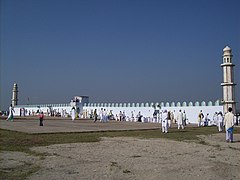ʿĪdgāh



A ʿĪdgāh ( Persian عيدگاه, DMG ʿĪd-gāh , 'festival place'), also pronounced Eidgah , is an open space on the outskirts of a city, where on the Islamic festivals ʿĪd al-Fiṭr and ʿĪd al-Aḍḥā the prayer specially prescribed for these days ( Arabic صلاة العيدين, DMG Ṣalāt al-ʿīdain , “Prayer of the Two Feasts”).
background
tradition
Open prayer places ( musallās ) are at the beginning of the early and largely nomadic Islamic prayer tradition; Closed and covered rooms were only avoided in bad weather (rain, sandstorm ) or in unbearable heat. Already early sources report that the Prophet ( nabī ) visited a place about 1000 paces from the walled mosque courtyard ( sahn ) on both feast days ; Here, however, he changed the traditional sequence - the prayer ( salāt ) stood at the beginning of the event and only then did the prayer leader ( imam ) begin his sermon ( chutba ).
Legal opinion
Later legal opinions ( fatwās ) confirm the old practices and justify them, among other things, with the large number of urban believers, for whom the space in a mosque was often insufficient. Through the common prayer of all believers in a large open area, the power and strength of Islam could be documented both internally and externally. Holding the oath prayers in a mosque was allowed, but a large open space was generally considered more suitable.
architecture
The numerous prayer places in the Islamic world were and are always open on all sides and upwards; an architectural design did not take place. Mainly in the Persian-Indian region and only in a few cases, however, the direction of prayer ( qibla ) is indicated by a wall, which is also emphasized in some cases by a niche ( mihrab ) and the raised seat ( minbar ) of the prayer leader. Side minarets are not essential.
See also
- Namazgjah (Elbasan) , Albania
Web links
- Eidgah Prayer and women (English)
